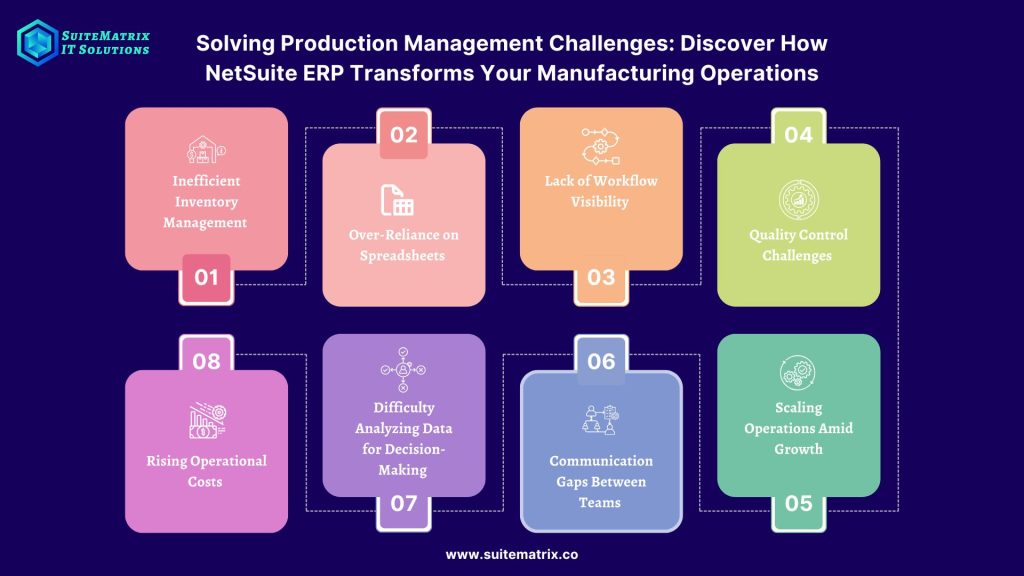
Manufacturing is a complex and demanding industry that requires precision, efficiency, and seamless communication between processes. However, many manufacturers struggle with common challenges like inefficient inventory management, dependency on outdated tools, and disconnected workflows. These issues can create bottlenecks, increase costs, and disrupt production timelines.
To address these problems, modern businesses are turning to ERP NetSuite systems. NetSuite, a comprehensive Cloud ERP Solution, helps manufacturers streamline operations, automate tasks, and gain better control over their production processes. In this blog, we’ll explore the most common production management challenges and explain how NetSuite ERP can transform your manufacturing operations.
1. Inefficient Inventory Management
For manufacturers, inventory is the lifeblood of production. Managing raw materials, work-in-progress (WIP), and finished goods is a constant juggling act. Unfortunately, manual processes or outdated systems can result in overstocking, stockouts, and inaccurate forecasts. These inefficiencies can disrupt production schedules and harm customer satisfaction.
How NetSuite Helps:
NetSuite ERP provides real-time visibility into inventory across multiple locations. Its advanced tracking features allow manufacturers to monitor inventory levels, set reorder points, and forecast demand accurately. This ensures that businesses always have the right materials in the right quantities, reducing waste and production delays.
2. Over-Reliance on Spreadsheets
Many manufacturers rely on spreadsheets for production planning, scheduling, and resource management. While spreadsheets may seem like a quick fix, they are prone to errors, lack scalability, and make collaboration difficult. As businesses grow, spreadsheets become a major bottleneck, limiting efficiency and increasing the risk of mistakes.
How NetSuite Helps:
NetSuite eliminates the need for spreadsheets by automating production planning and resource allocation. The system centralizes data, ensuring all stakeholders work with accurate, up-to-date information. Automation reduces manual errors, saves time, and allows manufacturers to focus on strategic tasks instead of repetitive data entry.
3. Lack of Workflow Visibility
Disconnected workflows and siloed departments make it hard to identify bottlenecks or inefficiencies in the production process. Without clear visibility, teams often operate reactively, addressing issues after they’ve already caused delays or disruptions.
How NetSuite Helps:
NetSuite integrates all manufacturing functions into a single platform, providing a unified view of the entire production process. This real-time visibility allows manufacturers to monitor operations, identify inefficiencies, and make proactive adjustments. With NetSuite, businesses can optimize workflows and ensure smooth operations from start to finish.

4. Quality Control Challenges
Maintaining consistent product quality while meeting regulatory requirements can be a daunting task. Manual processes for quality control often result in inconsistencies, leading to increased costs, rework, or customer dissatisfaction.
How NetSuite Helps:
NetSuite enables manufacturers to define quality standards and automate compliance checks at every stage of production. With real-time monitoring and reporting, manufacturers can ensure that products meet specifications and regulatory requirements. This helps improve customer satisfaction while reducing costs associated with quality issues.
5. Scaling Operations Amid Growth
As manufacturing businesses grow, they face new challenges like managing increased demand, expanding to new locations, and onboarding additional resources. Without a scalable system, growth can quickly become overwhelming.
How NetSuite Helps:
NetSuite ERP is designed to scale with your business. Its flexible modules allow manufacturers to adapt to changing needs, whether it’s managing new production lines, handling increased order volumes, or entering new markets. With NetSuite, businesses can grow confidently without compromising efficiency or control.
6. Communication Gaps Between Teams
In many manufacturing businesses, teams like procurement, production, and sales work in silos. This lack of collaboration leads to miscommunication, delays, and missed opportunities. For example, production delays might not be communicated to the sales team in time, resulting in frustrated customers.
How NetSuite Helps:
NetSuite breaks down silos by integrating all business functions into a single system. Teams can collaborate in real time, ensuring that everyone has access to the same information. For instance, if the production team updates the status of an order, the sales team can see it instantly, improving transparency and coordination.
7. Difficulty Analyzing Data for Decision-Making
Data is key to making informed decisions, but many manufacturers struggle to compile and analyze information effectively. Manual reporting or outdated systems lack the depth, speed, and accuracy required for strategic planning.
How NetSuite Helps:
NetSuite’s powerful analytics and reporting tools turn raw data into actionable insights. Manufacturers can generate reports on production costs, efficiency, and inventory trends in just a few clicks. These insights help businesses identify opportunities for improvement and make data-driven decisions to stay ahead of the competition.
8. Rising Operational Costs
Cost management is a major concern for manufacturers, especially in a competitive market. Inefficient processes, wasted resources, and outdated systems can drive up operational costs and reduce profit margins.
How NetSuite Helps:
NetSuite provides tools to track costs in real time and identify areas where savings can be achieved. By automating processes and optimizing resource allocation, NetSuite helps manufacturers reduce waste, control expenses, and maximize profitability.
Take Control of Your Production Processes
Manufacturing doesn’t have to be a constant battle with inefficiencies and outdated tools. By adopting modern solutions like NetSuite ERP, manufacturers can overcome production challenges, improve operational efficiency, and focus on growth.
With its comprehensive features, NetSuite is more than just an ERP system—it’s a complete Cloud ERP Solution that empowers manufacturers to take control of their production processes. From inventory management and quality control to workflow optimization and analytics, NetSuite offers everything you need to stay competitive in today’s fast-paced market.
Conclusion
Overcoming production challenges is essential for manufacturers to stay competitive. NetSuite ERP, implemented by SuiteMatrix IT Solutions, streamlines operations, automates tasks, and enhances visibility, helping you boost efficiency and reduce costs.
Partner with SuiteMatrix IT Solutions and transform your manufacturing processes with NetSuite ERP today!

One thought on “NetSuite ERP: The Ultimate Solution to Overcome Production Challenges Effectively ”